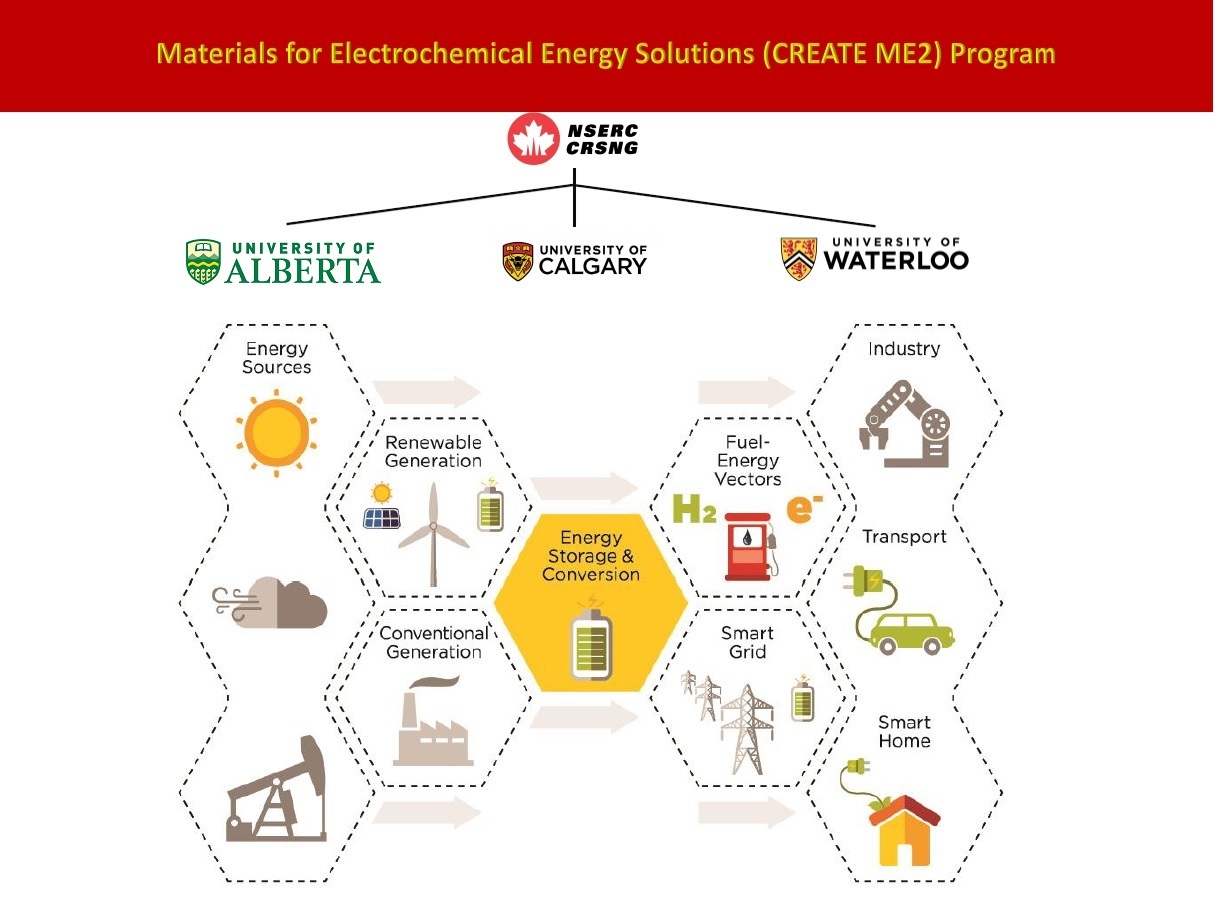Materials for Electrochemical Energy Solutions Initiative
The Materials for Electrochemical Energy Solutions Program is one of the University of Calgary-led NSERC CREATE initiatives. It focuses on the development of energy conversion and storage technologies to deliver a low carbon energy. Moving towards low carbon energy systems will require an increase in renewable electricity generation and decrease in use of hydrocarbon energy vectors. Critical to this transition is the availability of affordable and robust electrochemical technologies for the interconversion of fuel to electrical energy for provision of energy for the residential, transport and industrial sectors. Electrochemical energy conversion and storage technologies will play a key role in developing innovative, robust and cost-effective solutions to achieve this transition. In addition, development of new materials and associated technologies that can be successfully commercialized requires consideration of the economic, environmental, and regulatory context, as well as the challenges of manufacturing.
The COP21 Summit in Paris (2016) and provincial and federal strategy announcement in Canada have emphasized the urgent need for practical, low-carbon technologies for our future energy systems. Electrochemical processes used in batteries, electrolysers and fuel cells, enable the interconversion of chemical and electrical energy, and will play a key role in energy storage and conversion. There is thus a growing need for highly qualified personnel (HQP) with expertise in electrochemical energy conversion and storage technology, and can engage across society, industry, government or academia as technology developers or implementers.
The CREATE ME2 Program introduces four technology themes: large scale batteries for storing intermittent renewable wind and solar electricity generation; innovative solid state lithium batteries for automotive applications; fuel cells for efficient conversion of fuel to electricity for transport or combined heat and power, and processes which store energy by capturing carbon dioxide and converting it into a fuel. These technologies share common material requirements as well as economic, systems level analysis, and regulatory issues.
We provide training for HQP on both technical challenges, as well as the economic barriers for these technologies so that their research can target the critical issues. They learn about technology transfer challenges such as intellectual property, scale up, regulation and investment. In addition, to economic barriers they will have the opportunity to study environmental performance of the technology that they are working on in their research. The program thus develop technical expertise and combine this with economic and environmental perspectives. This will not only enable the research to be accelerated towards solutions that are suitable for commercialization and beneficial to the environment, but will also provide HQP with skills that will be of great value in a wide range of industries. In the long-term the CREATE will enable the formation of a Canadian hub in an international electrochemical energy conversion and storage network, and create a pipeline of experts who will be world-leaders in this field. The training program is structured around five themes: materials synthesis & fabrication, materials characterization, performance modeling and testing, sustainability/life cycle analysis, and techno-economic & technology.
The training program is delivered through four platforms: 1) special courses, 2) academic collaboration, 3) workshops, and 4) international and industry engagement. The CREATE aims to provide HQP with specialist and pan-disciplinary expertise, from fundamental science and engineering to manufacturing, innovation and implementation. The unique training, broad perspective and networking opportunities will enable trainees to transition rapidly to employment in industry, government or academia. The training on entrepreneurship and technology transfer in a research context will give HQP a unique skillset enabling employment and rapid progression in companies active in technology development and innovation. Overall, these new skills will place them in high demand with energy system developers, electricity and transportation companies, energy distributors, and policy makers.



